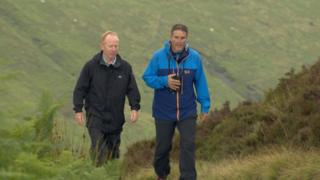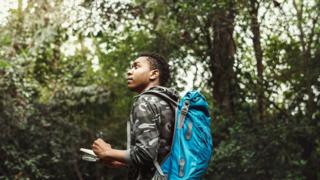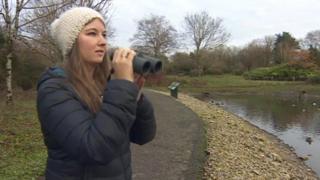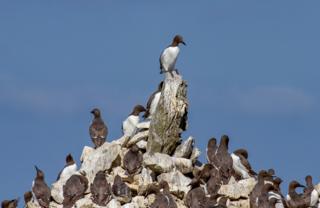
The role played by volunteers in monitoring the UK’s wildlife needs greater recognition, a leading Welsh naturalist has urged.
Broadcaster Iolo Williams said “absolutely vital” data was being gathered by a “huge army”.
But he claimed this was not always appreciated by those making key decisions on the environment.
The Welsh Government said it funded a range of important monitoring projects involving volunteers.
It comes after the recent State of Nature report, compiled by more than 70 wildlife charities, suggested there had been a 46% increase in time donated by volunteers for conservation work – including monitoring – across the UK since 2000.
Mr Williams said it was important for governments to understand that wildlife data, including numbers and distribution of species, “is more often than not gathered by people who are volunteers”.
“When you get to Welsh assembly, UK government and European level I don’t think they really appreciate that a lot of the information that is fed through to them to decide on policy has been collected by this huge army of volunteers out there – so our debt to them is a great one.”
 Image copyright Rawpixel/Getty Images
Image copyright Rawpixel/Getty Images
The Welsh Ornithological Society added its members often felt their work was “very much in the background”.
Chairman Mick Green said “almost all” of the monitoring in Wales was done by volunteers.
“The government is required to collect some of this data by various laws but they rely very much on the voluntary base to pick up the details because obviously people like Natural Resources Wales are having cuts year on year and they just don’t have the resources to do it.
“We’d like to have more resources available to help the volunteer base, to help train them more, perhaps pay their expenses for travel and so on.
“Our message to ministers is fund us – if you’re funding a volunteer network you’re getting much more bang for your buck because you’re getting all your time for free.”

Since she was a child, Dan Rouse from Llanelli, Carmarthenshire, has been monitoring birds at her local wetland reserve, documenting sighting of different species.
She uses an app to share data with researchers and other wildlife enthusiasts.
“All this data that is collected by everyone that plays their part gives us an idea of what’s happening to our country with things like climate change,” she said.
“We can see the numbers decreasing or increasing depending on whether the birds prefer warmer or colder conditions.”
“It also tells us about the impact of infrastructure projects, new roads and so on – and how we’re affecting their habitats”.
- Hundreds of species in Wales under threat
- The little bird whose first flight is 7,000 miles
- Erosion of wildlife ‘staggering’
In recent years, she has noticed an increase in young people wanting to get involved: “Nature is a hobby for teenagers now, there’s not a stigma anymore. It’s bringing a whole new generation into conservation.”
A Welsh Government spokesman said it was “extremely grateful to volunteers for the essential contribution they make in Wales”.
“We fund local environment record centres, which help to coordinate a range of important monitoring and surveillance projects, many of which involve volunteers, and we are funding a £2.8m project to strengthen existing local nature partnership coordinators.”
 Image copyright Getty Images
Image copyright Getty Images
How many people are involved in wildlife monitoring and why is it important?
The State of Nature report estimates 18,700 volunteers are involved in structured monitoring schemes that cover bats, birds, butterflies and plants – with the financial value of their time contribution put at £20.5m a year.
In addition, as many as 70,000 volunteers submit records to national recording schemes and societies or local environment records centres.
There are also widely publicised surveys such as the RSPB’s Big Garden Birdwatch, now in its 40th year and attracting almost 500,000 participants.
Monitoring “builds our knowledge of the natural world, and underpins efforts to conserve it, and to halt and reverse declines in nature”, the report says.
Original Article : HERE ;
from MetNews https://metnews.pw/army-of-wildlife-volunteers-need-recognition/
No comments:
Post a Comment